Contemporary Tourism: Development, Key Factors, and Societal Impacts
VerifiedAdded on 2023/06/09
|7
|1891
|93
Essay
AI Summary
This essay delves into the multifaceted world of contemporary tourism, examining its development, essential influencing factors, and the resulting impacts on society, economy, and environment. It identifies climate and weather, cultural and historical elements, religious and spiritual aspects, and technology as key factors shaping the tourism industry. The essay further analyzes the positive economic impacts, such as income generation and improved quality of life, alongside negative aspects like seasonal jobs and inflation. It also explores the environmental effects, highlighting revenue generation for conservation and resource management, as well as the challenges of resource exploitation and pollution. The study also addresses the socio-cultural dimension, noting both the promotion of cultural exchange and the risk of cultural identity loss. The essay concludes by emphasizing the importance of addressing existing challenges and formulating effective policies for sustainable tourism development, especially in light of the impact of events like the COVID-19 pandemic. Desklib offers similar solved assignments for students.
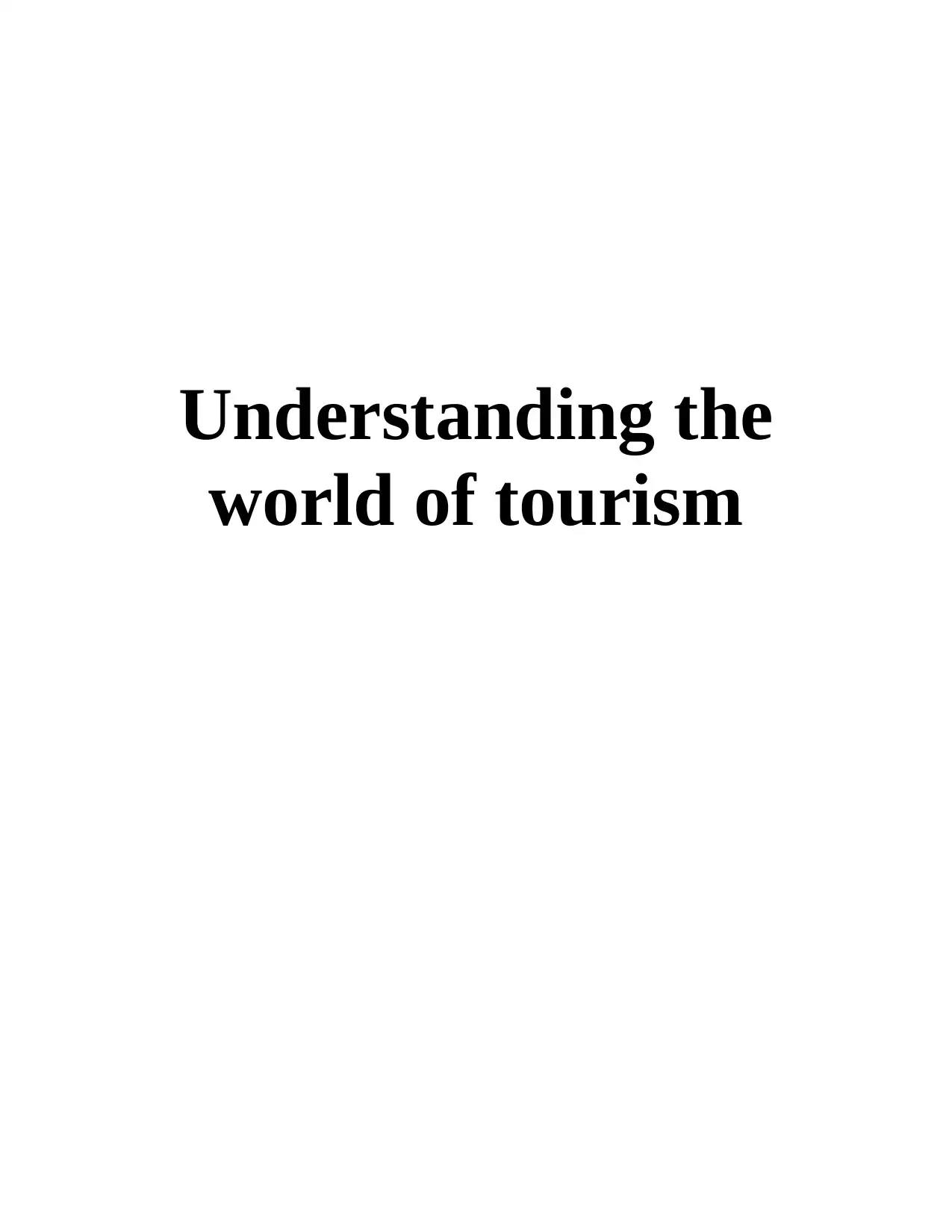
Understanding the
world of tourism
world of tourism
Paraphrase This Document
Need a fresh take? Get an instant paraphrase of this document with our AI Paraphraser
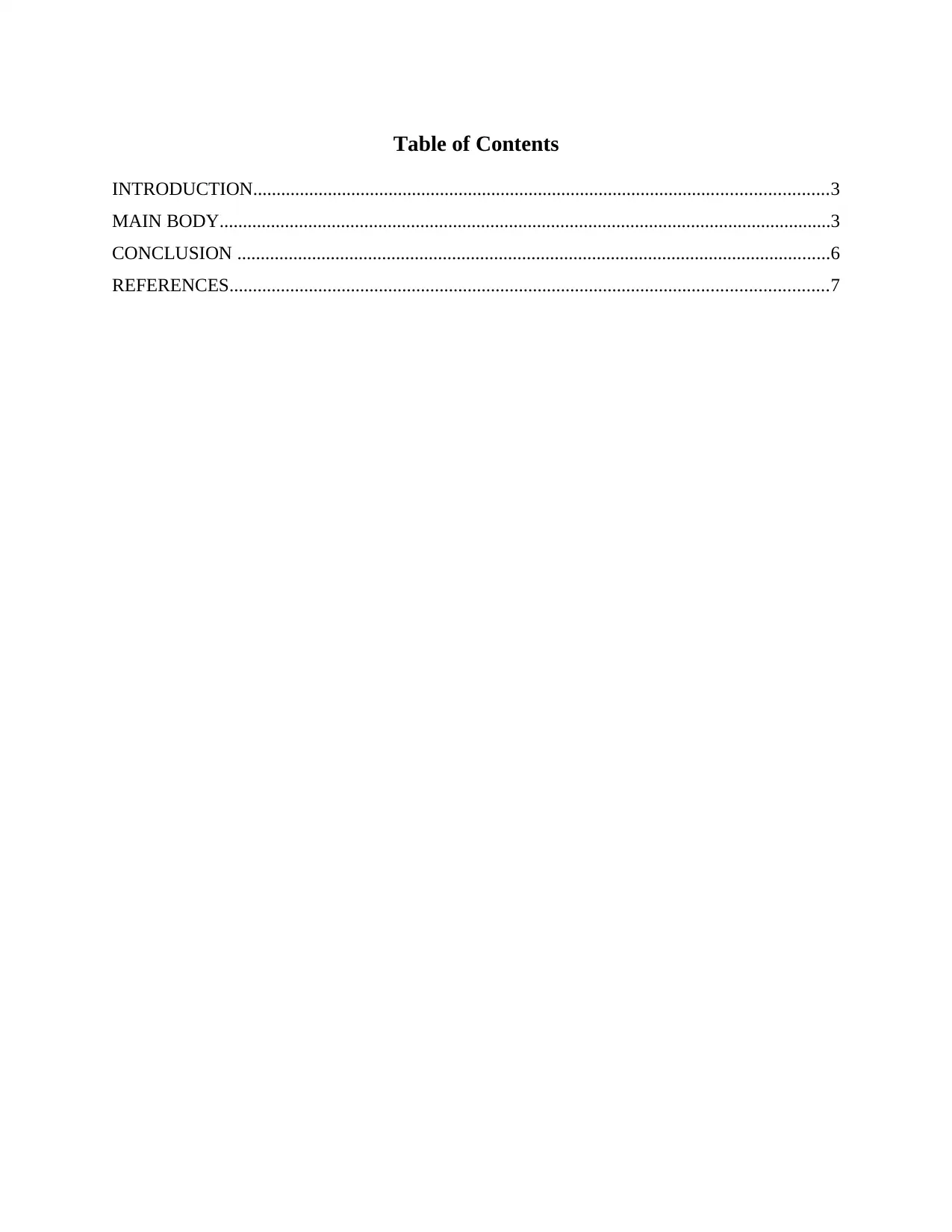
Table of Contents
INTRODUCTION...........................................................................................................................3
MAIN BODY...................................................................................................................................3
CONCLUSION ...............................................................................................................................6
REFERENCES................................................................................................................................7
INTRODUCTION...........................................................................................................................3
MAIN BODY...................................................................................................................................3
CONCLUSION ...............................................................................................................................6
REFERENCES................................................................................................................................7
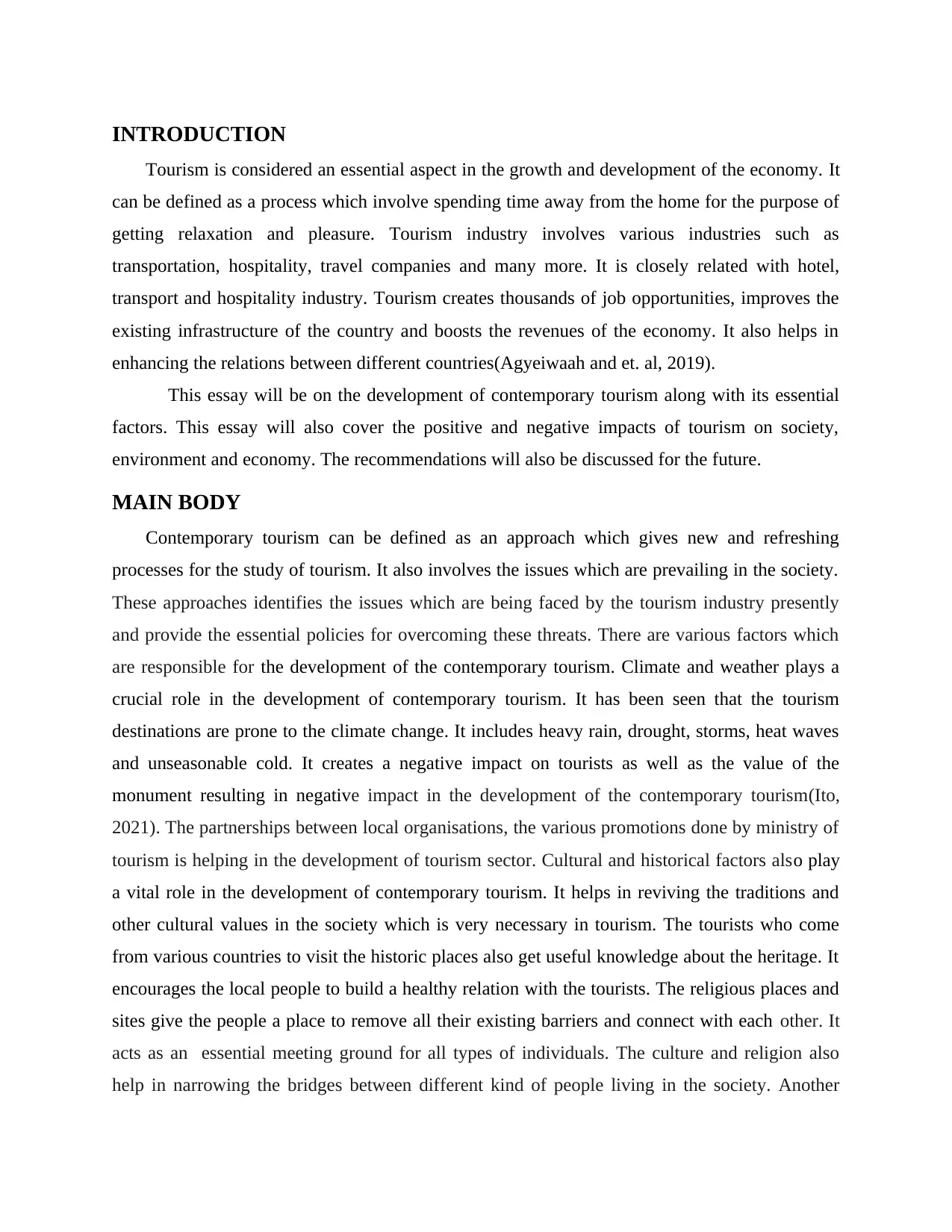
INTRODUCTION
Tourism is considered an essential aspect in the growth and development of the economy. It
can be defined as a process which involve spending time away from the home for the purpose of
getting relaxation and pleasure. Tourism industry involves various industries such as
transportation, hospitality, travel companies and many more. It is closely related with hotel,
transport and hospitality industry. Tourism creates thousands of job opportunities, improves the
existing infrastructure of the country and boosts the revenues of the economy. It also helps in
enhancing the relations between different countries(Agyeiwaah and et. al, 2019).
This essay will be on the development of contemporary tourism along with its essential
factors. This essay will also cover the positive and negative impacts of tourism on society,
environment and economy. The recommendations will also be discussed for the future.
MAIN BODY
Contemporary tourism can be defined as an approach which gives new and refreshing
processes for the study of tourism. It also involves the issues which are prevailing in the society.
These approaches identifies the issues which are being faced by the tourism industry presently
and provide the essential policies for overcoming these threats. There are various factors which
are responsible for the development of the contemporary tourism. Climate and weather plays a
crucial role in the development of contemporary tourism. It has been seen that the tourism
destinations are prone to the climate change. It includes heavy rain, drought, storms, heat waves
and unseasonable cold. It creates a negative impact on tourists as well as the value of the
monument resulting in negative impact in the development of the contemporary tourism(Ito,
2021). The partnerships between local organisations, the various promotions done by ministry of
tourism is helping in the development of tourism sector. Cultural and historical factors also play
a vital role in the development of contemporary tourism. It helps in reviving the traditions and
other cultural values in the society which is very necessary in tourism. The tourists who come
from various countries to visit the historic places also get useful knowledge about the heritage. It
encourages the local people to build a healthy relation with the tourists. The religious places and
sites give the people a place to remove all their existing barriers and connect with each other. It
acts as an essential meeting ground for all types of individuals. The culture and religion also
help in narrowing the bridges between different kind of people living in the society. Another
Tourism is considered an essential aspect in the growth and development of the economy. It
can be defined as a process which involve spending time away from the home for the purpose of
getting relaxation and pleasure. Tourism industry involves various industries such as
transportation, hospitality, travel companies and many more. It is closely related with hotel,
transport and hospitality industry. Tourism creates thousands of job opportunities, improves the
existing infrastructure of the country and boosts the revenues of the economy. It also helps in
enhancing the relations between different countries(Agyeiwaah and et. al, 2019).
This essay will be on the development of contemporary tourism along with its essential
factors. This essay will also cover the positive and negative impacts of tourism on society,
environment and economy. The recommendations will also be discussed for the future.
MAIN BODY
Contemporary tourism can be defined as an approach which gives new and refreshing
processes for the study of tourism. It also involves the issues which are prevailing in the society.
These approaches identifies the issues which are being faced by the tourism industry presently
and provide the essential policies for overcoming these threats. There are various factors which
are responsible for the development of the contemporary tourism. Climate and weather plays a
crucial role in the development of contemporary tourism. It has been seen that the tourism
destinations are prone to the climate change. It includes heavy rain, drought, storms, heat waves
and unseasonable cold. It creates a negative impact on tourists as well as the value of the
monument resulting in negative impact in the development of the contemporary tourism(Ito,
2021). The partnerships between local organisations, the various promotions done by ministry of
tourism is helping in the development of tourism sector. Cultural and historical factors also play
a vital role in the development of contemporary tourism. It helps in reviving the traditions and
other cultural values in the society which is very necessary in tourism. The tourists who come
from various countries to visit the historic places also get useful knowledge about the heritage. It
encourages the local people to build a healthy relation with the tourists. The religious places and
sites give the people a place to remove all their existing barriers and connect with each other. It
acts as an essential meeting ground for all types of individuals. The culture and religion also
help in narrowing the bridges between different kind of people living in the society. Another
⊘ This is a preview!⊘
Do you want full access?
Subscribe today to unlock all pages.

Trusted by 1+ million students worldwide
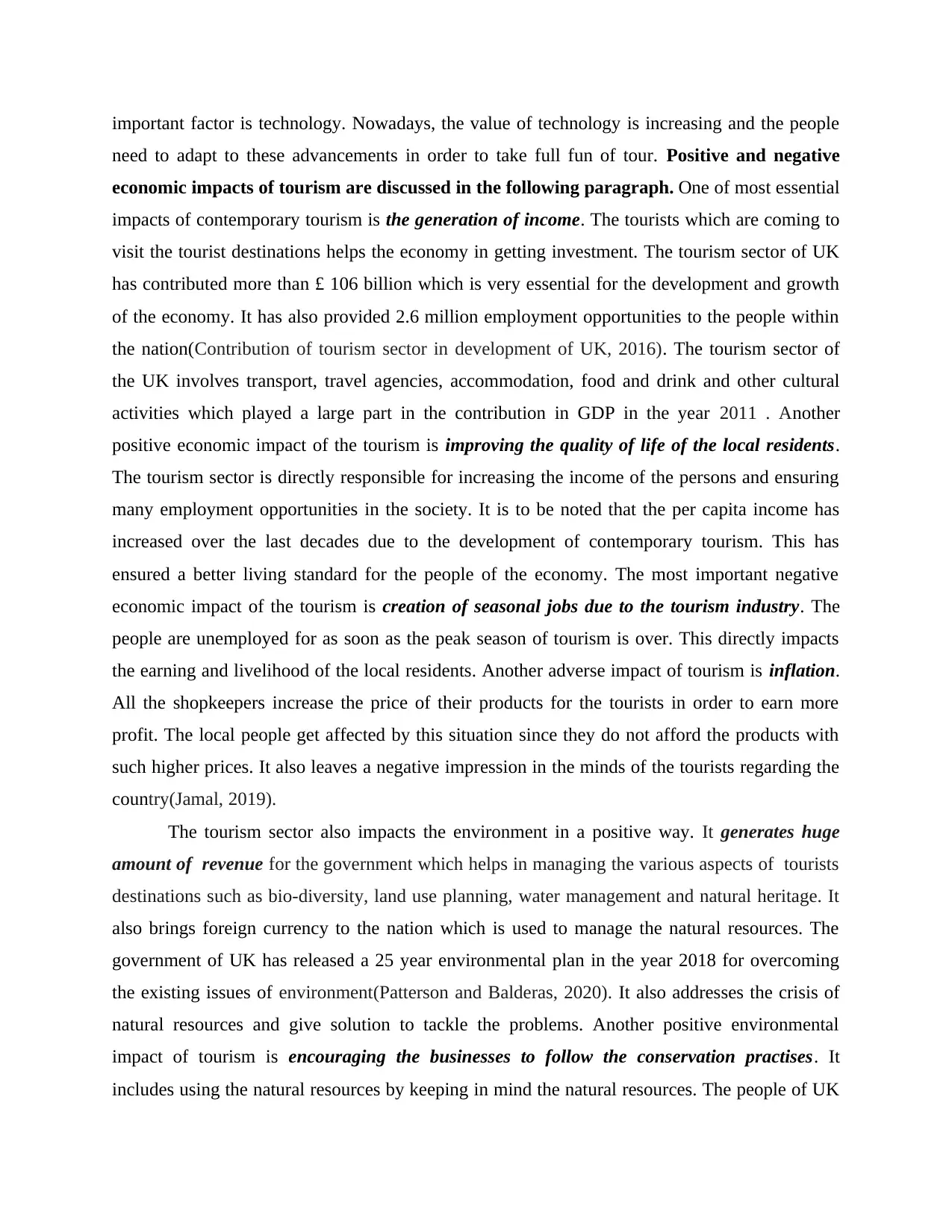
important factor is technology. Nowadays, the value of technology is increasing and the people
need to adapt to these advancements in order to take full fun of tour. Positive and negative
economic impacts of tourism are discussed in the following paragraph. One of most essential
impacts of contemporary tourism is the generation of income. The tourists which are coming to
visit the tourist destinations helps the economy in getting investment. The tourism sector of UK
has contributed more than £ 106 billion which is very essential for the development and growth
of the economy. It has also provided 2.6 million employment opportunities to the people within
the nation(Contribution of tourism sector in development of UK, 2016). The tourism sector of
the UK involves transport, travel agencies, accommodation, food and drink and other cultural
activities which played a large part in the contribution in GDP in the year 2011 . Another
positive economic impact of the tourism is improving the quality of life of the local residents.
The tourism sector is directly responsible for increasing the income of the persons and ensuring
many employment opportunities in the society. It is to be noted that the per capita income has
increased over the last decades due to the development of contemporary tourism. This has
ensured a better living standard for the people of the economy. The most important negative
economic impact of the tourism is creation of seasonal jobs due to the tourism industry. The
people are unemployed for as soon as the peak season of tourism is over. This directly impacts
the earning and livelihood of the local residents. Another adverse impact of tourism is inflation.
All the shopkeepers increase the price of their products for the tourists in order to earn more
profit. The local people get affected by this situation since they do not afford the products with
such higher prices. It also leaves a negative impression in the minds of the tourists regarding the
country(Jamal, 2019).
The tourism sector also impacts the environment in a positive way. It generates huge
amount of revenue for the government which helps in managing the various aspects of tourists
destinations such as bio-diversity, land use planning, water management and natural heritage. It
also brings foreign currency to the nation which is used to manage the natural resources. The
government of UK has released a 25 year environmental plan in the year 2018 for overcoming
the existing issues of environment(Patterson and Balderas, 2020). It also addresses the crisis of
natural resources and give solution to tackle the problems. Another positive environmental
impact of tourism is encouraging the businesses to follow the conservation practises. It
includes using the natural resources by keeping in mind the natural resources. The people of UK
need to adapt to these advancements in order to take full fun of tour. Positive and negative
economic impacts of tourism are discussed in the following paragraph. One of most essential
impacts of contemporary tourism is the generation of income. The tourists which are coming to
visit the tourist destinations helps the economy in getting investment. The tourism sector of UK
has contributed more than £ 106 billion which is very essential for the development and growth
of the economy. It has also provided 2.6 million employment opportunities to the people within
the nation(Contribution of tourism sector in development of UK, 2016). The tourism sector of
the UK involves transport, travel agencies, accommodation, food and drink and other cultural
activities which played a large part in the contribution in GDP in the year 2011 . Another
positive economic impact of the tourism is improving the quality of life of the local residents.
The tourism sector is directly responsible for increasing the income of the persons and ensuring
many employment opportunities in the society. It is to be noted that the per capita income has
increased over the last decades due to the development of contemporary tourism. This has
ensured a better living standard for the people of the economy. The most important negative
economic impact of the tourism is creation of seasonal jobs due to the tourism industry. The
people are unemployed for as soon as the peak season of tourism is over. This directly impacts
the earning and livelihood of the local residents. Another adverse impact of tourism is inflation.
All the shopkeepers increase the price of their products for the tourists in order to earn more
profit. The local people get affected by this situation since they do not afford the products with
such higher prices. It also leaves a negative impression in the minds of the tourists regarding the
country(Jamal, 2019).
The tourism sector also impacts the environment in a positive way. It generates huge
amount of revenue for the government which helps in managing the various aspects of tourists
destinations such as bio-diversity, land use planning, water management and natural heritage. It
also brings foreign currency to the nation which is used to manage the natural resources. The
government of UK has released a 25 year environmental plan in the year 2018 for overcoming
the existing issues of environment(Patterson and Balderas, 2020). It also addresses the crisis of
natural resources and give solution to tackle the problems. Another positive environmental
impact of tourism is encouraging the businesses to follow the conservation practises. It
includes using the natural resources by keeping in mind the natural resources. The people of UK
Paraphrase This Document
Need a fresh take? Get an instant paraphrase of this document with our AI Paraphraser
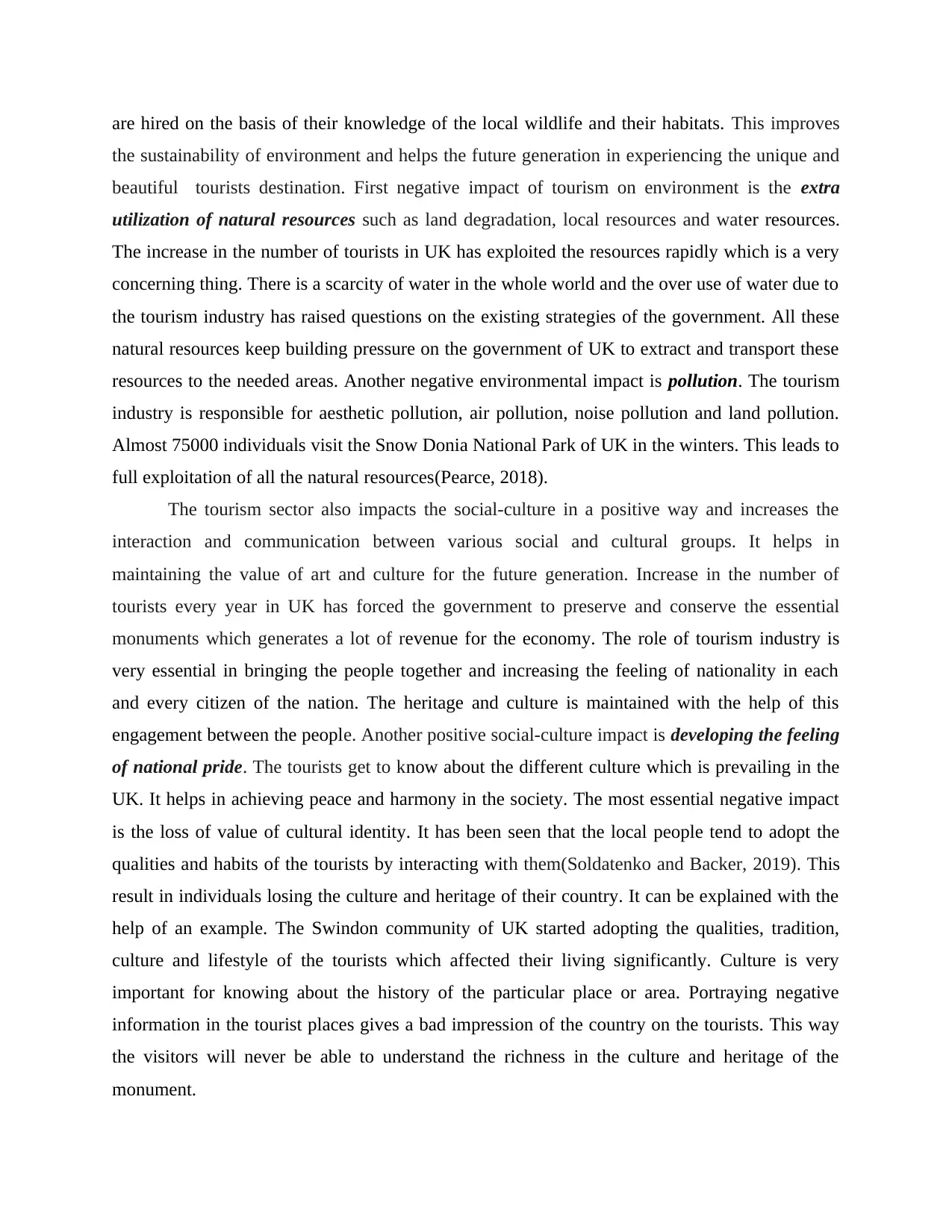
are hired on the basis of their knowledge of the local wildlife and their habitats. This improves
the sustainability of environment and helps the future generation in experiencing the unique and
beautiful tourists destination. First negative impact of tourism on environment is the extra
utilization of natural resources such as land degradation, local resources and water resources.
The increase in the number of tourists in UK has exploited the resources rapidly which is a very
concerning thing. There is a scarcity of water in the whole world and the over use of water due to
the tourism industry has raised questions on the existing strategies of the government. All these
natural resources keep building pressure on the government of UK to extract and transport these
resources to the needed areas. Another negative environmental impact is pollution. The tourism
industry is responsible for aesthetic pollution, air pollution, noise pollution and land pollution.
Almost 75000 individuals visit the Snow Donia National Park of UK in the winters. This leads to
full exploitation of all the natural resources(Pearce, 2018).
The tourism sector also impacts the social-culture in a positive way and increases the
interaction and communication between various social and cultural groups. It helps in
maintaining the value of art and culture for the future generation. Increase in the number of
tourists every year in UK has forced the government to preserve and conserve the essential
monuments which generates a lot of revenue for the economy. The role of tourism industry is
very essential in bringing the people together and increasing the feeling of nationality in each
and every citizen of the nation. The heritage and culture is maintained with the help of this
engagement between the people. Another positive social-culture impact is developing the feeling
of national pride. The tourists get to know about the different culture which is prevailing in the
UK. It helps in achieving peace and harmony in the society. The most essential negative impact
is the loss of value of cultural identity. It has been seen that the local people tend to adopt the
qualities and habits of the tourists by interacting with them(Soldatenko and Backer, 2019). This
result in individuals losing the culture and heritage of their country. It can be explained with the
help of an example. The Swindon community of UK started adopting the qualities, tradition,
culture and lifestyle of the tourists which affected their living significantly. Culture is very
important for knowing about the history of the particular place or area. Portraying negative
information in the tourist places gives a bad impression of the country on the tourists. This way
the visitors will never be able to understand the richness in the culture and heritage of the
monument.
the sustainability of environment and helps the future generation in experiencing the unique and
beautiful tourists destination. First negative impact of tourism on environment is the extra
utilization of natural resources such as land degradation, local resources and water resources.
The increase in the number of tourists in UK has exploited the resources rapidly which is a very
concerning thing. There is a scarcity of water in the whole world and the over use of water due to
the tourism industry has raised questions on the existing strategies of the government. All these
natural resources keep building pressure on the government of UK to extract and transport these
resources to the needed areas. Another negative environmental impact is pollution. The tourism
industry is responsible for aesthetic pollution, air pollution, noise pollution and land pollution.
Almost 75000 individuals visit the Snow Donia National Park of UK in the winters. This leads to
full exploitation of all the natural resources(Pearce, 2018).
The tourism sector also impacts the social-culture in a positive way and increases the
interaction and communication between various social and cultural groups. It helps in
maintaining the value of art and culture for the future generation. Increase in the number of
tourists every year in UK has forced the government to preserve and conserve the essential
monuments which generates a lot of revenue for the economy. The role of tourism industry is
very essential in bringing the people together and increasing the feeling of nationality in each
and every citizen of the nation. The heritage and culture is maintained with the help of this
engagement between the people. Another positive social-culture impact is developing the feeling
of national pride. The tourists get to know about the different culture which is prevailing in the
UK. It helps in achieving peace and harmony in the society. The most essential negative impact
is the loss of value of cultural identity. It has been seen that the local people tend to adopt the
qualities and habits of the tourists by interacting with them(Soldatenko and Backer, 2019). This
result in individuals losing the culture and heritage of their country. It can be explained with the
help of an example. The Swindon community of UK started adopting the qualities, tradition,
culture and lifestyle of the tourists which affected their living significantly. Culture is very
important for knowing about the history of the particular place or area. Portraying negative
information in the tourist places gives a bad impression of the country on the tourists. This way
the visitors will never be able to understand the richness in the culture and heritage of the
monument.
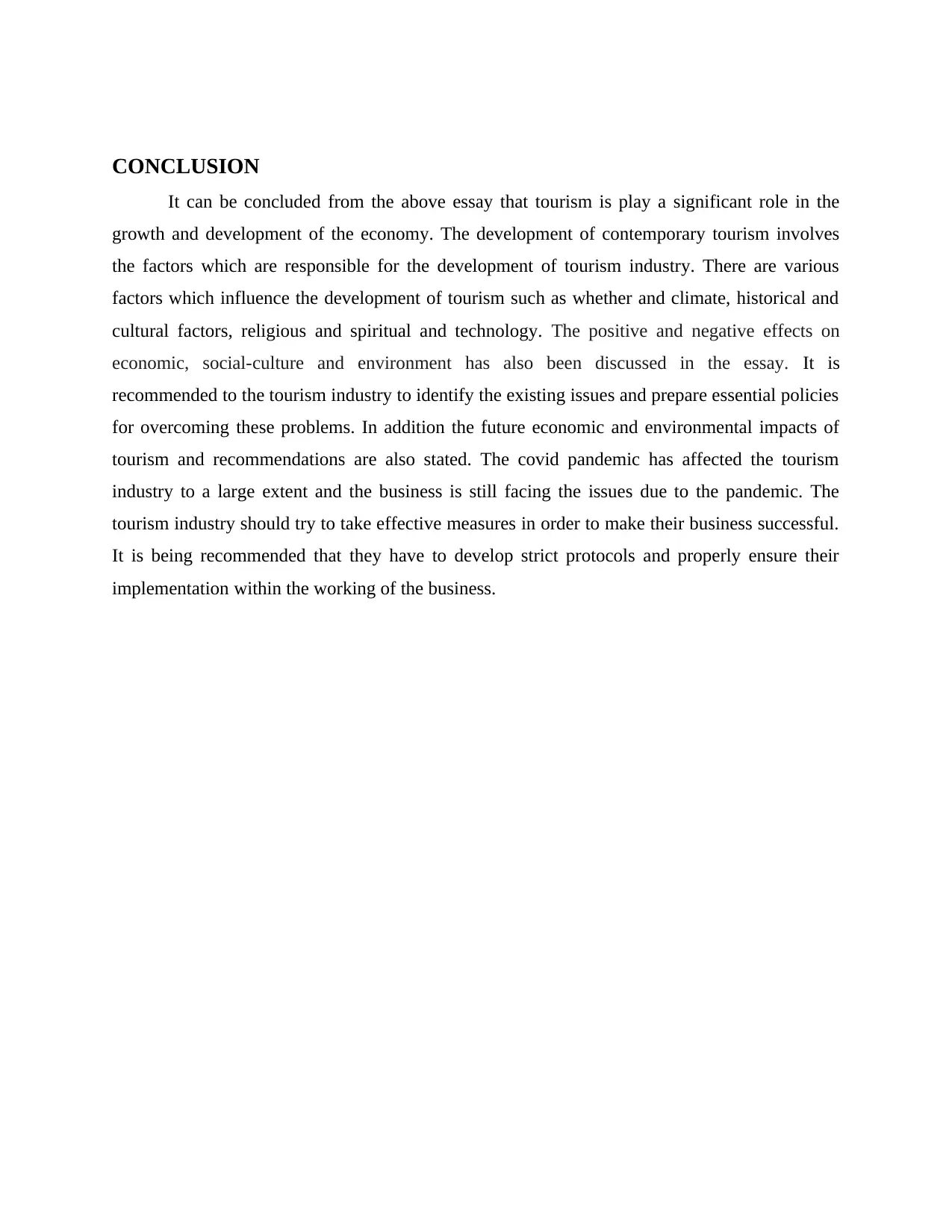
CONCLUSION
It can be concluded from the above essay that tourism is play a significant role in the
growth and development of the economy. The development of contemporary tourism involves
the factors which are responsible for the development of tourism industry. There are various
factors which influence the development of tourism such as whether and climate, historical and
cultural factors, religious and spiritual and technology. The positive and negative effects on
economic, social-culture and environment has also been discussed in the essay. It is
recommended to the tourism industry to identify the existing issues and prepare essential policies
for overcoming these problems. In addition the future economic and environmental impacts of
tourism and recommendations are also stated. The covid pandemic has affected the tourism
industry to a large extent and the business is still facing the issues due to the pandemic. The
tourism industry should try to take effective measures in order to make their business successful.
It is being recommended that they have to develop strict protocols and properly ensure their
implementation within the working of the business.
It can be concluded from the above essay that tourism is play a significant role in the
growth and development of the economy. The development of contemporary tourism involves
the factors which are responsible for the development of tourism industry. There are various
factors which influence the development of tourism such as whether and climate, historical and
cultural factors, religious and spiritual and technology. The positive and negative effects on
economic, social-culture and environment has also been discussed in the essay. It is
recommended to the tourism industry to identify the existing issues and prepare essential policies
for overcoming these problems. In addition the future economic and environmental impacts of
tourism and recommendations are also stated. The covid pandemic has affected the tourism
industry to a large extent and the business is still facing the issues due to the pandemic. The
tourism industry should try to take effective measures in order to make their business successful.
It is being recommended that they have to develop strict protocols and properly ensure their
implementation within the working of the business.
⊘ This is a preview!⊘
Do you want full access?
Subscribe today to unlock all pages.

Trusted by 1+ million students worldwide
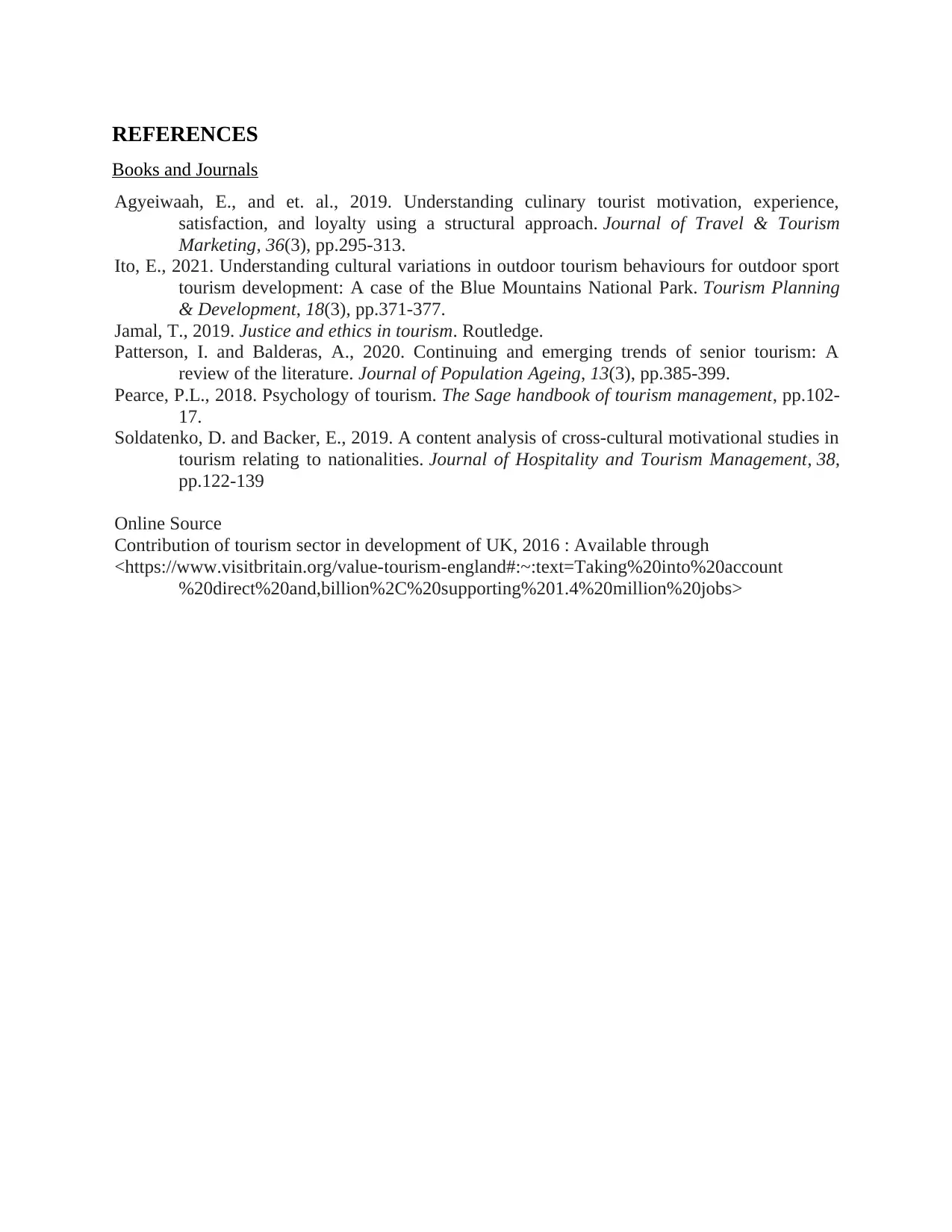
REFERENCES
Books and Journals
Agyeiwaah, E., and et. al., 2019. Understanding culinary tourist motivation, experience,
satisfaction, and loyalty using a structural approach. Journal of Travel & Tourism
Marketing, 36(3), pp.295-313.
Ito, E., 2021. Understanding cultural variations in outdoor tourism behaviours for outdoor sport
tourism development: A case of the Blue Mountains National Park. Tourism Planning
& Development, 18(3), pp.371-377.
Jamal, T., 2019. Justice and ethics in tourism. Routledge.
Patterson, I. and Balderas, A., 2020. Continuing and emerging trends of senior tourism: A
review of the literature. Journal of Population Ageing, 13(3), pp.385-399.
Pearce, P.L., 2018. Psychology of tourism. The Sage handbook of tourism management, pp.102-
17.
Soldatenko, D. and Backer, E., 2019. A content analysis of cross-cultural motivational studies in
tourism relating to nationalities. Journal of Hospitality and Tourism Management, 38,
pp.122-139
Online Source
Contribution of tourism sector in development of UK, 2016 : Available through
<https://www.visitbritain.org/value-tourism-england#:~:text=Taking%20into%20account
%20direct%20and,billion%2C%20supporting%201.4%20million%20jobs>
Books and Journals
Agyeiwaah, E., and et. al., 2019. Understanding culinary tourist motivation, experience,
satisfaction, and loyalty using a structural approach. Journal of Travel & Tourism
Marketing, 36(3), pp.295-313.
Ito, E., 2021. Understanding cultural variations in outdoor tourism behaviours for outdoor sport
tourism development: A case of the Blue Mountains National Park. Tourism Planning
& Development, 18(3), pp.371-377.
Jamal, T., 2019. Justice and ethics in tourism. Routledge.
Patterson, I. and Balderas, A., 2020. Continuing and emerging trends of senior tourism: A
review of the literature. Journal of Population Ageing, 13(3), pp.385-399.
Pearce, P.L., 2018. Psychology of tourism. The Sage handbook of tourism management, pp.102-
17.
Soldatenko, D. and Backer, E., 2019. A content analysis of cross-cultural motivational studies in
tourism relating to nationalities. Journal of Hospitality and Tourism Management, 38,
pp.122-139
Online Source
Contribution of tourism sector in development of UK, 2016 : Available through
<https://www.visitbritain.org/value-tourism-england#:~:text=Taking%20into%20account
%20direct%20and,billion%2C%20supporting%201.4%20million%20jobs>
1 out of 7
Related Documents
Your All-in-One AI-Powered Toolkit for Academic Success.
+13062052269
info@desklib.com
Available 24*7 on WhatsApp / Email
![[object Object]](/_next/static/media/star-bottom.7253800d.svg)
Unlock your academic potential
Copyright © 2020–2026 A2Z Services. All Rights Reserved. Developed and managed by ZUCOL.


